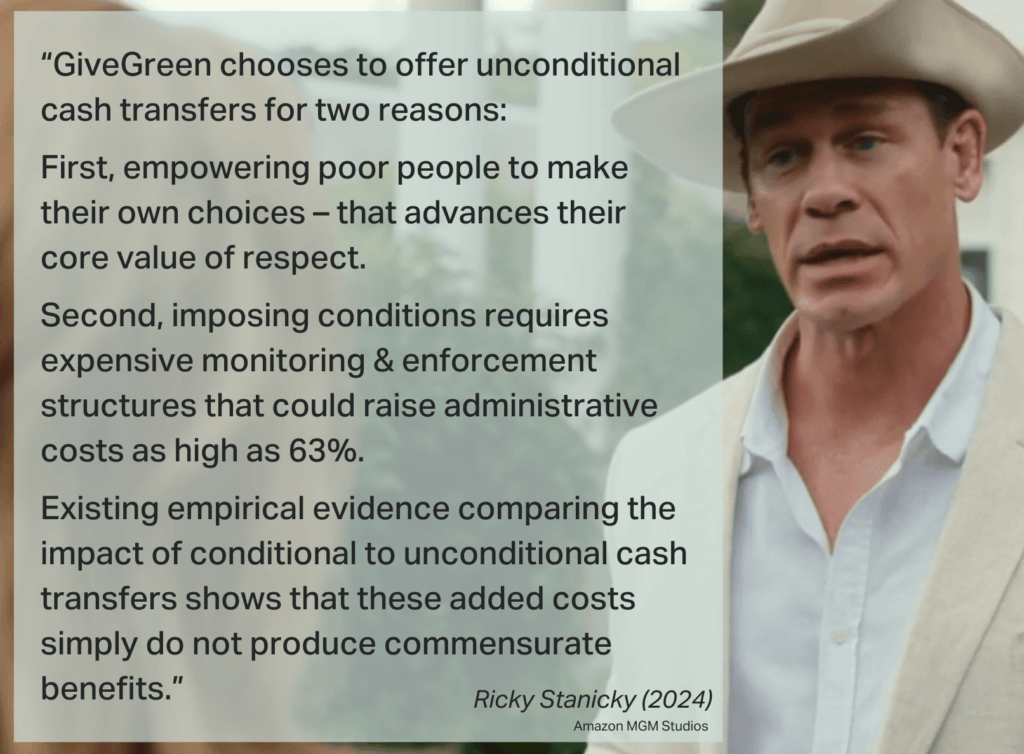A recent Amazon movie includes a scene about cash transfers, which tells an important truth about conditioning cash.
“GiveGreen chooses to offer unconditional cash transfers for two reasons. First, empowering poor people to make their own choices – that advances their core value of respect. Second, imposing conditions requires expensive monitoring & enforcement structures that could raise administrative costs as high as 63%. Existing empirical evidence comparing the impact of conditional to unconditional cash transfers shows that these added costs simply do not produce commensurate benefits.”
John Cena in Ricky Stanicky (2024)
✅ It’s true that the added cost of putting conditions to cash often does not produce commensurate benefits
John Cena’s character is right that “existing empirical evidence comparing the impact of conditional to unconditional cash transfers shows that these added costs simply do not produce commensurate benefits.”
GiveDirectly exclusively delivers your donations unconditionally, never requiring recipients to do anything in exchange for the funds. Other groups give cash conditionally, leveraging the money to encourage a desirable behavior like school attendance – bring your kids to school and you get the money, otherwise you do not.
Conditioning cash is sometimes better at increasing that one desired behavior, but as John Cena points out: at what cost?
Adding conditions to cash can triple program overheads
Enforcing conditions brings added expense that can triple operational costs, as the data below shows. Put another way, a $1M program giving $500 per person would reach 300 fewer people by adding conditions.
Families that fail to meet conditions are often the most in need of the cash
- In a conditional education program, the poorest families were more likely to be the ones excluded for failing to bring their kids to school, thus missing out on the benefit of urgently needed cash.
- Another comparison found teenage girls who received conditional cash were more likely to get pregnant or marry early than those getting unconditional cash. Why? When girls getting conditional cash dropped out of school, they stopped receiving money so were more likely to marry for financial stability. Girls getting unconditional cash who dropped out could still support themselves so were less likely to marry young.
We can use nudges rather than conditions to encourage desired behaviors
- A comparison found simply labeling unconditional cash as an “education support program” produced the same boost to attendance as conditioning the cash on attendance, and at a lower cost.
- GiveDirectly has used design nudges to encourage investment in farming. By sending cash during planting and harvest seasons, we saw farmers choosing to spend on climate-smart farm inputs they normally forgo due to costs. For a discussion on the ethics of nudges, watch here→
Taking all this into account, is it worth reaching fewer people by adding conditions? We’re with John Cena on this one.
FAQs
What is this movie/scene about?
Ricky Stanicky (2024) is an Amazon comedy about three buddies who cover for their immature behavior by inventing a fictitious friend ‘Ricky’ as an alibi. In their telling, ‘Ricky’ is hard to reach because he’s busy working in Africa at various charities. When their families get suspicious, they hire a no-name actor (played by John Cena) to bring ‘Ricky’ to life, but an incredulous in-law grills Ricky about a specific Kenyan cash transfer charity he’d supposedly worked for. Luckily, actor Ricky did his homework on the evidence. The scene starts at 51:00→
Was this a GiveDirectly product placement?
No, this isn’t something we paid for or even contributed to. It seems the movie’s creative team independently took inspiration for ‘GiveGreen’ from GiveDirectly:
- We also started in Kenya, and respect / putting recipients first is our #1 value→
- The fact that “imposing conditions can raise administrative costs as high as 63%” comes straight from our website→
So, in a way, your support helped get unconditional cash transfers to Hollywood.
